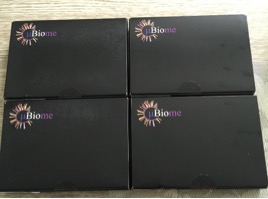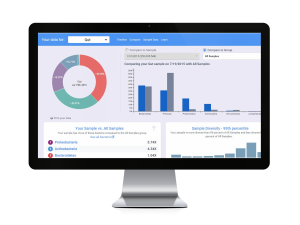Yes, I am obsessed with microbes. Viruses, bacteria, fungi are amazing and powerful critters. I think about them, write about them and try to lead my life in a way that encourages healthy ones to make my gut their home. So, naturally, I am very curious to know more about the particular gut bugs that live inside my digestive tract. Is what I am doing working – do I have a healthy microbiome?
Happily, there are ways to find out more about our own, individual microbial colonies. All it takes to get a personal analysis is a testing kit, a poo sample, an envelope and return postage. The non-profit American Gut Project is one place to go to obtain personalized microbial analysis. uBiome, a venture-funded, for-profit biomedical company, is another.
The non-profit American Gut Project is one place to go to obtain personalized microbial analysis. uBiome, a venture-funded, for-profit biomedical company, is another.
Healthy Gut Bugs reached out to uBiome to obtain four gut microbiome testing kits, one for each member of our family. We thought it would be interesting to compare our differing diets and antibiotics exposures with our results. Jessica Richman, CEO and co-founder of uBiome, kindly agreed to send the gut-testing kits (current price $89) free of charge so we could share experience with our readers. I will post about our experience in taking these tests in a separate post.
What Does uBiome Do?
uBiome is a California based privately funded1 technology company that allows people to submit samples of their microbiome for genetic sequencing. uBiome offers four types of microbe analysis tests – gut, mouth, genitals, and ears or nose.
The test results provided compare the species found in a customer’s particular microbiome to the microbial make-ups of different groups of people in uBiome’s current data set, such as vegetarians, heavy drinkers, healthy omnivores and more. They provide an overview of the dominant microbes found in each customer’s sample. Additionally, they provide summary information as to the major functions provided by those microbes found in significant numbers in the sample.
uBiome is collecting and compiling the data it receives from its customers and conducting research to learn more about the human microbiome with the ultimate goal of sequencing the human microbiome. The greater the number of people who have their microbiomes analyzed by uBiome, the more comprehensive and useful their data will become. They have tens of thousands of samples (and growing) in their data set.
What to Expect from the Test Results
Once the sample has been sequenced, you will be able to log into uBiome’s site to review your results.
uBiome will provide your results via an interactive site that provides listings of the mo st abundant phylum, class, order genus, species of microbes found in your sample in any significat percentages and includes the percentages of each that was found. You can click on the name of any of these allows you to drill down further to find out more about each one. You can compare your results to uBiome’s entire data set, or instead to particular groups of people classified according to sex or lifestyle (alcohol consumption, diet, weight, etc). (Image 1 is a partial view of the interactive results).
st abundant phylum, class, order genus, species of microbes found in your sample in any significat percentages and includes the percentages of each that was found. You can click on the name of any of these allows you to drill down further to find out more about each one. You can compare your results to uBiome’s entire data set, or instead to particular groups of people classified according to sex or lifestyle (alcohol consumption, diet, weight, etc). (Image 1 is a partial view of the interactive results).
For many of the microbes that are found in your sample, you can click on the name to find out more about them. However, there are other microbes that can be identified by the test for which medical science does not yet understand the effect, if any, on the body, so knowing that you have a certain microbe will not necessarily provide any insight into what that might mean for your health.
The results also provide information as to how effective your sample is, compared those of other groups, at carbohydrate, fat, amino acid and vitamin metabolism. Information on the abilities your bacteria have, is also provided. These results are likely more useful to those in the microbiology or medical fields than to lay users.
Since medical science does not yet know either what an ideal microbiome looks like, or what it would look like in cases of particular diseases, the results that you receive cannot be used for diagnostic purposes at this point of time. But you do get to be part of the medical pioneer community, permitting your results to be aggregated with others’ in the interest of developing scientific understanding.
Concerns with Microbial Sequencing
Privacy is a potential issue that you should consider before undertaking the test. Along with your sample, you submit an extensive healthy questionnaire including information such as your diet, smoking habits, health and other daily habits. Although there are systems in place to keep your sample data anonymous, and the company promises to keep all of this confidential and takes this seriously, we all know computer-based privacy breaches can occur.
Additionally, along with microbial genetic information, the sample will also include bits your own human DNA. Therefore, it is in theory possible that a user is providing more information about themselves than they intend to. On the other hand, though, we are always shedding bits of our DNA as we go through our daily lives, in the form of saliva, skin cells, hair follicles and sperm/vaginal secretions that could also be personally linked to us.
Health professionals worry that the information that users of such services receive is only of limited usefulness to them. Unfortunately, at this point, medical science does not really understand fully what constitutes a good microbiome. You will not be able to diagnose any healthy problems with your results. Further, uBiome does not provide users with access to doctors to help them interpret their results so being able to translate them into actual specific steps to improve one’s health based on one’s results is a bit of a leap. However, more and more doctors are becoming aware of the importance of a healthy microbiome and some of them even recommend that their patients get their microbiomes tested as part of a thorough personalized medicine plan.
Additionally, users have reported that they have sent feces samples (taken from the same exact bowel movement and sent out on the same day) to different labs for sampling, including uBiome and American Gut Project, and found that the results varied dramatically from lab to lab. One would expect different labs, interpreting essentially the same poo sample to provide somewhat similar results. Reports like this lend uncertainty as to how accurate personalized microbial analysis at this point. This is very new science and the lab protocols are not yet fully standardized.
Why Test Your Microbiome
The tests will provide information as to the major bacterial players residing in your gut microbiome and give you general information as to whether these are health promoting or health inhibiting microbes. If you suspect a gut problem, the information the test provides might confirm a microbial imbalance that can lead to such problems.
When tests are taken over time in partnership with lifestyle changes such as losing weight, reducing alcohol intake, adding fermented foods to your diet, or increasing dietary fiber, you will be able to see if these changes are, in fact, leading to a corresponding increased diversity of microbes (a good thing) along with a larger proportion of healthy gut bugs. It might also be useful to have an analysis to determine if a long course of antibiotics had resulted in a loss of microbial diversity in the gut.
There is a strong correlation between obesity and an unhealthy gut microbiome and science has identified several microbes that are linked to weight gain. For example, Firmicutes bacteria are more efficient than Bacteroidetes at harvesting calories from food and those people with a relative abundance of Firmicutes are more likely to be obese than their Bacteroidetes-abundant peers. People struggling to lose weight may be interested in having a gut microbiome analysis to determine if their particular microbial mix is working against them.
Although it is interesting and fun to learn more about the microbes that cohabitate our bodies, critics have raised some legitimate concerns about undertaking microbial sequencing at this point in time, when the technology is in its infancy. However, if you are curious enjoy being a microbial pioneer, like I do, you may elect to undertake the test, knowing that some of these issues will be resolved later on, as the technology, knowledge of gut microbes and norms around privacy evolve.
- My husband and I are small seed investors [↩]





Thank you for the informative post. After suffering from an inability to gain weight- I am looking forward to getting my test results back to see if I have an imbalance
Im not convinced it is helpful
anyone find out something that helped in some way?
https://www.sciencenews.org/blog/gory-details/here%E2%80%99s-poop-getting-your-gut-microbiome-analyzed
I purchased a UBiome Kit. Looking forward to getting my results, but after months of waiting for my results I was told I’d have to resubmit another sample.
Sharon, go to the American Gut Project or the uBiome website and contact them asking for a testing kit. Then, using the swab and container they provide, swab the area you want tested (swab the feces for a gut bacteria test), and then send it to them. A few months later they will send you the results – it’s not fast. Costs around 80-90 dollars
How do I participate in this testing of my gut bacteria?? I am very interested.